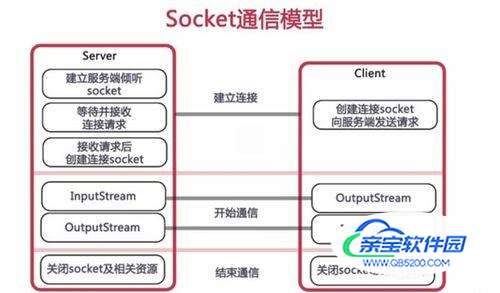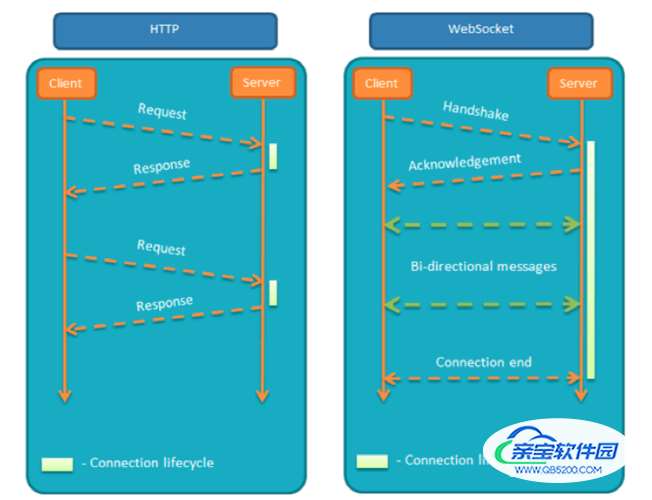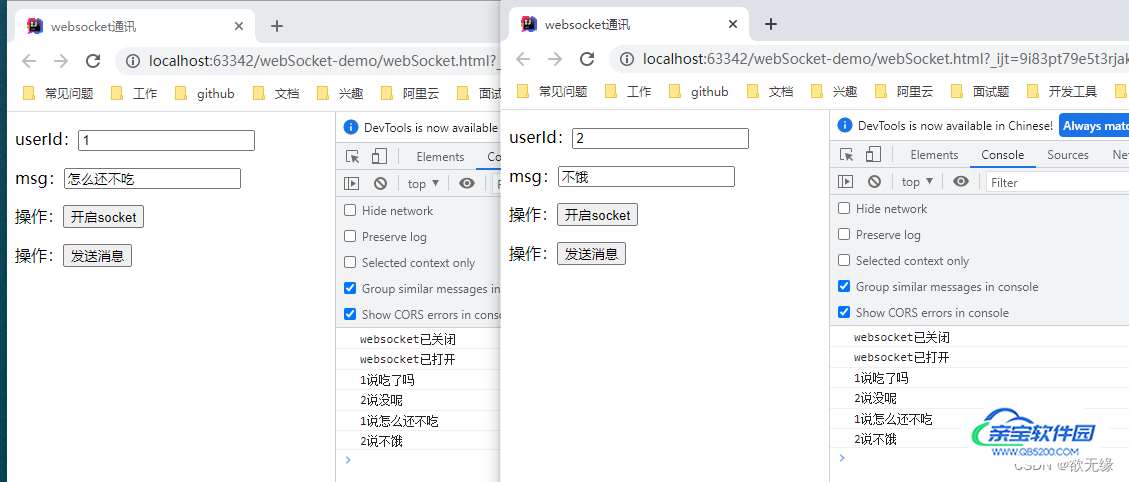SpringBoot整合WebSocket实现聊天室流程全解
欲无缘 人气:0什么是WebSocket
WebSocket是一种在单个TCP连接上进行全双工通信的协议。WebSocket使得客户端和服务器之间的数据交换变得更加简单,允许服务端主动向客户端推送数据。在WebSocket API中,浏览器和服务器只需要完成一次握手,两者之间就直接可以创建持久性的连接,并进行双向数据传输。
WebSocket通信模型

为什么需要WebSocket
http 通信是单向的,发送请求获取响应,没有请求也就没有响应。
简单理解:
- HTTP 打电话:客户端问一句服务端答一句
- WebSocket 打电话:双向对话

Websocket与http的关系

相同点:
- 都是基于tcp的,都是可靠性传输协议
- 都是应用层协议
不同点:
- WebSocket是双向通信协议,模拟Socket协议,可以双向发送或接受信息
- HTTP是单向的
- WebSocket是需要浏览器和服务器握手进行建立连接的而http是浏览器发起向服务器的连接,服务器预先并不知道这个连接。
SpringBoot集成WebSocket
maven依赖
<dependency>
<groupId>org.springframework.boot</groupId>
<artifactId>spring-boot-starter-websocket</artifactId>
</dependency>
WebSocketConfig
@Configuration
public class WebSocketConfig {
@Bean
public ServerEndpointExporter serverEndpointExporter() {
return new ServerEndpointExporter();
}
}
WebSocketService
@Slf4j
@Service
@ServerEndpoint(value = "/myService/{userId}")
public class WebSocketService {
/**
* 静态变量,用来记录当前在线连接数。应该把它设计成线程安全的。
*/
private static AtomicInteger onlineCount = new AtomicInteger(0);;
/**
* concurrent包的线程安全Set,用来存放每个客户端对应的MyWebSocket对象。
*/
private static ConcurrentHashMap<String,WebSocketService> webSocketMap = new ConcurrentHashMap<>();
/**
* concurrent包的线程安全Set,用来存放每个客户端对应的session对象。
*/
private static ConcurrentHashMap<String,Session> sessionMap = new ConcurrentHashMap<>();
/**
* 与某个客户端的连接会话,需要通过它来给客户端发送数据
*/
private Session session;
private String userId = "";
/**
* 连接建立成功调用的方法
*/
@OnOpen
public void onOpen(Session session,@PathParam("userId") String userId) {
this.session = session;
this.userId = userId;
if(webSocketMap.containsKey(userId) && sessionMap.containsKey(userId)){
webSocketMap.remove(userId);
sessionMap.remove(userId);
sessionMap.put(userId,session);
webSocketMap.put(userId,this);
}else{
webSocketMap.put(userId,this);
sessionMap.put(userId,session);
addOnlineCount();
}
log.info("用户连接:"+userId+",当前在线人数为:" + getOnlineCount());
}
/**
* 连接关闭调用的方法
*/
@OnClose
public void onClose() {
if(webSocketMap.containsKey(userId)){
webSocketMap.remove(userId);
subOnlineCount();
}
log.info("用户退出:"+userId+",当前在线人数为:" + getOnlineCount());
}
/**
* 收到客户端消息后调用的方法
*/
@OnMessage
public void onMessage(String message, Session session) {
this.session = session;
log.info("收到客户端消息 -> {}",message);
//服务端收到客户端的消息并推送给客户端
sendMessage(message);
}
/**
* 发生错误时调用
*/
@OnError
public void onError(Session session, Throwable error) {
log.error(error.getMessage());
}
/**
* 实现服务器主动推送 可以通过controller调用此方法实现主动推送
*/
public void sendMessage(String message){
try {
Set<Map.Entry<String, Session>> entries = sessionMap.entrySet();
for (Map.Entry<String, Session> next : entries) {
Session session = next.getValue();
session.getBasicRemote().sendText(this.userId + "说" + message);
}
} catch (IOException e) {
log.error(e.getMessage());
}
}
public static synchronized int getOnlineCount() {
return onlineCount.get();
}
public static synchronized void addOnlineCount() {
WebSocketService.onlineCount.getAndIncrement();
}
public static synchronized void subOnlineCount() {
WebSocketService.onlineCount.getAndDecrement();
}
}WebSocket.html
<!DOCTYPE html>
<html>
<head>
<meta charset="utf-8">
<title>websocket通讯</title>
</head>
<body>
<p>userId:<input id="userId" name="userId" type="text" value="10"></p>
<p>msg:<input id="contentText" name="contentText" type="text" value="hello websocket"></p>
<p>操作:<button onclick="openSocket()">开启socket</button></p>
<p>操作:<button onclick="sendMessage()">发送消息</button></p>
</body>
<script type="application/javascript">
let socket;
function openSocket() {
if(socket != null){
socket.close();
socket = null;
}
let userId = document.getElementById('userId').value
socket = new WebSocket("ws://localhost:9000/myService/"+userId);
//打开事件
socket.onopen = function() {
console.log("websocket已打开");
};
//获得消息事件
socket.onmessage = function(msg) {
console.log(msg.data);
};
//关闭事件
socket.onclose = function() {
console.log("websocket已关闭");
};
//发生了错误事件
socket.onerror = function() {
console.log("websocket发生了错误");
}
}
function sendMessage() {
let contentText = document.getElementById('contentText').value
socket.send(contentText);
}
</script>
</html>测试

加载全部内容